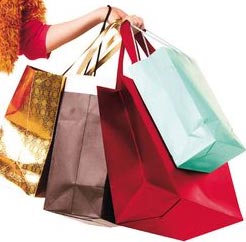 Oniomania sounds like an obsession with onions, but it is actually the uncontrollable desire to buy things. Many Americans are afflicted with an addiction to shopping and/or compulsive overspending. Those with this addiction, sometimes referred to as shopaholics, experience the highs and lows of other addicts such as drug addicts or alcoholics. Compulsive shopping can be a destructive addiction with serious financial and personal consequences.
Oniomania sounds like an obsession with onions, but it is actually the uncontrollable desire to buy things. Many Americans are afflicted with an addiction to shopping and/or compulsive overspending. Those with this addiction, sometimes referred to as shopaholics, experience the highs and lows of other addicts such as drug addicts or alcoholics. Compulsive shopping can be a destructive addiction with serious financial and personal consequences.
Not since Gordon Gekko declared, “Greed is good,” in Oliver Stone’s movie Wall Street has visible consumerism been so popular or acceptable. The public is constantly inundated by signals to spend money. Our politicians tell us to spend money to stimulate the economy. Magazines are littered with advertisements, articles and layouts promoting consumption. Television shows feature high-end designer goods and lavish lifestyles. There are at least two television channels dedicated to 24 hour shopping. Other channels feature infomercials geared towards shoppers after regular programming has ceased. Shopping without ever leaving your home is easier than ever – consumers are a mere mouse click or phone call away from what they desire. Easy credit allows people to buy far beyond their ability to pay. With all of these strong messages urging us to spend, it’s hard to know where to draw the line.
When does shopping transform from a necessity or a fun pastime into a serious problem? Take our Shopaholics Quiz to see if you are addicted to shopping or guilty of compulsive overspending:
- Do you use shopping to improve your mood?
- Do you use shopping as a reward for good behavior?
- Do you spend more money shopping than you can afford?
- Do you rationalize your overspending (e.g. it was on sale, it’s just a little splurge, this was a bargain, etc.)?
- Do you feel giddy or “high” when you make a purchase?
- Do you feel guilt, regret or shame after shopping?
- Do you have “secret” credit cards?
- Do you hide purchases?
- Do you forget purchases you bought?
- Do you tell your loved ones you spent less than you did on shopping?
- Do you shop year-round?
- Is it hard for you to browse without purchasing?
- Can you stop yourself from shopping?
- Does shopping preoccupy your thoughts?
- If you cannot purchase something you want, do you feel overly angry, upset or frustrated?
- Do you juggle expenses to accommodate your shopping?
- Is your shopping hurting your overall budget?
- Do you dread the day your bills come in the mail?
- Are you often surprised at the amount you’ve spent when confronted by a credit card bill, your bank statement, a loved one or your accountant?
- Are you honest with your loved ones about how much you spend or what you buy?
- Is your shopping behavior hurting a loved one (e.g. loved one who has to pay bills, children who need college funds, a parent who has to cover your debt, etc.)?
If you answered “yes” to several of the questions, you might have a shopping or spending addiction. If your spending habits are having a negative impact on your personal relationships or finances, you probably have an addiction issue. A shopping addiction occurs when spending becomes obsessive, excessive and chronic.
People who are addicted to shopping behave like other addicts. For shopping addicts, buying is their high much like alcohol is a high for an alcoholic. Shopping addicts may not even care about what they purchased once they leave the store. Those who compulsively overspend or engage in binge shopping usually feel shame or guilt after making purchases which results in covering up purchases or expenses. Shopaholics usually buy items to fill a void in their lives. Compulsive shopping or overspending can be a way to cope with stress, sadness, anger or other negative feelings. A person addicted to shopping continues to shop excessively even after they experience negative consequences from their behavior. Compulsive overspending can ruin relationships, destroy finances and wreak havoc with the addict’s self esteem.
Fortunately, this addiction is treatable. If you feel you have a shopping addiction, a compulsive overspending problem or can’t curb your shopping voluntarily – you should seek professional help. It’s never too late to correct your path and repair damage. Identifying and admitting you have a problem is the first step to recovery. Getting professional help is the greatest gift you can give to yourself or a loved one.

